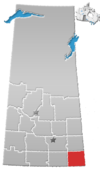Rural municipality in Saskatchewan, Canada
| Wawken No. 93 | |
|---|---|
| Rural municipality | |
| Rural Municipality of Wawken No. 93 | |
 Location of the RM of Wawken No. 93 in Saskatchewan Location of the RM of Wawken No. 93 in Saskatchewan | |
| Coordinates: 49°55′37″N 102°10′48″W / 49.927°N 102.180°W / 49.927; -102.180 | |
| Country | Canada |
| Province | Saskatchewan |
| Census division | 1 |
| SARM division | 1 |
| Federal riding | Souris—Moose Mountain |
| Provincial riding | Cannington Moosomin |
| Formed | January 1, 1913 |
| Government | |
| • Reeve | Darrell Petterson |
| • Governing body | RM of Wawken No. 93 Council |
| • Administrator | Katelyn Ethier |
| • Office location | Wawota |
| Area | |
| • Land | 766.57 km (295.97 sq mi) |
| Population | |
| • Total | 571 |
| • Density | 0.7/km (2/sq mi) |
| Time zone | CST |
| • Summer (DST) | CST |
| Postal code | S0G 5A0 |
| Area code(s) | 306 and 639 |
The Rural Municipality of Wawken No. 93 (2016 population: 571) is a rural municipality (RM) in the Canadian province of Saskatchewan within Census Division No. 1 and SARM Division No. 1. It is located in the southeast portion of the province.
History
The RM of Wawken No. 93 incorporated as a rural municipality on January 1, 1913. Although possessing a sound inventory similar to many Saskatchewan place names of indigenous Algonquian origin, the name Wawken is in fact a portmanteau of Wawota and Kennedy, the RM's two main urban communities.
Geography
Communities and localities
The following urban municipalities are surrounded by the RM.
The following unincorporated communities are within the RM.
- Localities
Demographics
| Year | Pop. | ±% |
|---|---|---|
| 1981 | 765 | — |
| 1986 | 759 | −0.8% |
| 1991 | 737 | −2.9% |
| 1996 | 708 | −3.9% |
| 2001 | 643 | −9.2% |
| 2006 | 613 | −4.7% |
| 2011 | 559 | −8.8% |
| 2016 | 571 | +2.1% |
| Source: Statistics Canada via Saskatchewan Bureau of Statistics | ||
In the 2021 Census of Population conducted by Statistics Canada, the RM of Wawken No. 93 had a population of 614 living in 287 of its 554 total private dwellings, a change of 7.5% from its 2016 population of 571. With a land area of 743.5 km (287.1 sq mi), it had a population density of 0.8/km (2.1/sq mi) in 2021.
In the 2016 Census of Population, the RM of Wawken No. 93 recorded a population of 571 living in 250 of its 597 total private dwellings, a 2.1% change from its 2011 population of 559. With a land area of 766.57 km (295.97 sq mi), it had a population density of 0.7/km (1.9/sq mi) in 2016.
Economy
Agriculture plays an important role in the RM.
Attractions
Government
The RM of Wawken No. 93 is governed by an elected municipal council and an appointed administrator that meets on the second Thursday of every month. The reeve of the RM is Dawn Cameron while its administrator is Katelyn Ethier. The RM's office is located in Wawota.
See also
References
- "Pre-packaged CSV files - CGN, Canada/Province/Territory (cgn_sk_csv_eng.zip)". Government of Canada. July 24, 2019. Retrieved May 23, 2020.
- ^ "Rural Municipality Incorporations (Alphabetical)". Saskatchewan Ministry of Municipal Affairs. Archived from the original on April 21, 2011. Retrieved May 9, 2020.
- ^ "Municipality Details: RM of Wawken No. 93". Government of Saskatchewan. Retrieved May 21, 2020.
- ^ "Population and dwelling counts, for Canada, provinces and territories, and census subdivisions (municipalities), 2016 and 2011 censuses – 100% data (Saskatchewan)". Statistics Canada. February 8, 2017. Retrieved May 1, 2020.
- Barry, Bill (2005). Geographic Names of Saskatchewan. Regina, Saskatchewan: People Places Publishing Ltd. ISBN 1-897010-19-2.
- "Saskatchewan Census Population" (PDF). Saskatchewan Bureau of Statistics. Archived from the original (PDF) on September 24, 2015. Retrieved May 9, 2020.
- "Saskatchewan Census Population". Saskatchewan Bureau of Statistics. Retrieved May 9, 2020.
- "Population and dwelling counts: Canada, provinces and territories, census divisions and census subdivisions (municipalities), Saskatchewan". Statistics Canada. February 9, 2022. Retrieved April 13, 2022.
- Sask Biz
| Division No. 1, Saskatchewan | |||||
|---|---|---|---|---|---|
| Cities |  | ||||
| Towns | |||||
| Villages | |||||
| Rural municipalities | |||||
| First Nations | |||||
| Indian reserves | |||||
| Unincorporated communities |
| ||||
|
| |||||